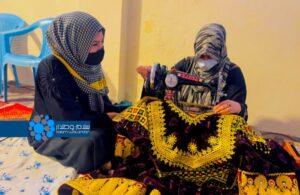KABUL (SW) – Forced marriages, underage marriages and family violence continue to compel a number of women in different provinces to think about ending relationships after years of living together with their husbands.
Mehtab Iftikhar is one of these women. She says that after her father’s death, her mother got married to another man, and finally her stepfather forced her to marry her cousin, who was 18 years old when she was just 10 years old. Mehtab adds: “I was in the class three, they transferred me there from Kabul under the pretext of my brother’s wedding in Helmand province. I was 10 years old, but my body was like a seven-year-old child. Later, when they took me to Helmand province, I thought it was my brother’s wedding there.”
Mehtab says that at that time, she did not understand anything about marriage, but had no choice but to give in to it. Mehtab lived with her husband for 15 years a life that, according to her, that was passed by coercion, cruelty, beating and abuse by her husband and her husband’s family members.
Mehtab is now 26 years old and is the mother of two children (a boy and a girl). She lost three daughters in the first years of the marriage due to their weakness and disability.
A year ago, due to the increase in violence by her husband and her husband’s family members, she decides to end her life together, but her family members opposed her divorce and told her that she went to her husband’s house in a white dress and should leave it with a white coffin.
However, Mehtab, who could no longer bear the family violence, filed for divorce and finally separated from her husband a year ago.
Separation from her husband and away from her children and difficult living conditions for Mehtab in Afghanistan, caused her to migrate to Iran and continue her life there. “I was subjected to a lot of oppression, physical work was done to me, I was in Helmand province for seven years, I could not see the outside. They used to beat me a lot and I filed for divorce within a year. It took a year for me to succeed. I heard the warning, they said we will kill you, stone you. I even heard warnings from my midwife, aunt and everyone.”
Forced marriage, underage marriage and family violence have made many women want to end their marriage. In this report, 19 women were interviewed, out of which, 13 of them separated from their husbands and fiancees after marriage and six others during the engagement period due to violence or coercion.
Out of these 19 women, only two of them regret getting divorced from their husbands, but 17 others are fully satisfied with getting divorce from their husbands. Among the women who were interviewed in this report, six said child marriage, five others said violence by their husbands or members of their husband’s family, and six others said forced marriage as the reason for separating from their husbands or fiancees.
One of the five women who cited family violence as a reason for ending their marriage is Raqeeba. She, who is the mother of two children, says that she has been divorced from her husband for two months and lives with her children in her father’s house. She says that she was forced into marriage by her family at the age of 14, but after marriage, physical violence from her husband forced her to divorce him.
Rakiba says: “I got married at the age of 14, I didn’t want to get married, I wanted to study, but my parents forced me to get married and my family took a lot of money for it. But after marriage, my husband used to beat me.”
Shabana, a resident of Jawzjan and another interviewee in this report, who was forced into marriage at the age of 15, says that after marriage, she had no love for her husband, and this caused her mother-in-law to constantly abuse her.
Shabana adds that the intensity of violence and beating by her mother-in-law caused her to separate from her husband. This separation dates back to 10 years ago, and since then, she has been living at her father’s house.
She says: “My anger was torturing me, he didn’t treat me well, I had to relieve myself, he even warned me that I will paralyze you. The shock that I saw there, my eyes closed, my anger tortured me a lot.”
Of the 19 women interviewed in this report, six of them broke up with their fiancees during the engagement period. Farida, one of these women who was forced to be engaged by her family, says that after two years of engagement, she ended her relationship due to lack of understanding with her fiancé.
She adds: “My family forced me into this relationship and I didn’t have any feelings towards my fiance and I cried day and night and I always felt restless and I didn’t have any feelings towards my fiance.”
At the same time, there are also women who are married of their own choice, but due to the unpleasant circumstances that happened during their life together, they have separated from their husbands.
Latifa, one of the interviewees in this report, who is 35 years old, divorced her husband nearly nine months ago due to his second marriage. This is despite the fact that they were married with mutual consent and love for each other. She was pregnant when she separated from her husband and now she is the mother of three children aged six, four and six months.
She says that after the separation, her husband did not pay any attention to her or to her children.
Latifa adds: “The current situation for me is that I see myself at a crossroads because I can neither help myself nor my children. My eldest son, who is six years old, always asks me about his father, but since his father is no longer interested in me, he doesn’t know anything about his own children. He has not even seen my six-month-old daughter, who was born in my father’s house.”
Although a number of women separate from their husbands due to problems in their lives together, but the issue of divorce is not always accepted by society and people do not have a good view of women who separate from their husbands. This issue is confirmed by seven interviewees and they say that people have always called them divorced women and they themselves have been blamed for separating from their husbands.
Yasmin, a resident of Jawzjan, who has been separated from her husband for two years due to his drug addiction, says that after her divorce, people look down on her.
She adds: “I heard the conversation of my uncle’s daughter and my aunt’s child, they all said that you were not good and you did not compromise with your husband, the people said. They were all saying the same thing.”
Maryam, a resident of Parwan and one of the interviewees in this report, who broke up with her fiance three months ago, says that now people do not look at her favorably.
She adds: “People’s vision is not as good as it should be. People think what bad thing we had, what negative thing is in ourselves or our family that separated us. No matter what, people put a label on us.”
However, a number of women’s rights activists also say that forced marriages, child marriages and abuse in Afghanistan cause divorce between husband and wife. They confirm that in Afghanistan divorced women are not seen well and divorce has become a social problem.
Sahar Rezaei, a women’s rights activist, says: “In my opinion, divorce in Afghanistan means that a girl who wants to get a divorce should think that she is facing a big problem and that a woman cannot get a divorce easily. Especially in these two years of the rule of the Islamic Emirate.”
Wajma Yacoubi, another women’s rights activist, also says: “During the engagement period, they do not get to know each other fully, and this also causes them to separate after the wedding, and another issue for women is forced marriage or disapproval of marriage at a young age. This also causes divorce. Men use force and oppression on their women.”
Abdul Rahim Rashid, spokesman and head of publications of the Supreme Court of Afghanistan/Supreme Court of Afghanistan, tells Salaam Watandar that this court is working on a procedure regarding the conditions of divorce, which will be shared with the media after it is finalized.
Marriage, which is formed to form a family by providing its own specific conditions, causes a man and a woman to start their common and loving life together; However, non-compliance with the conditions of marriage in a number of marriages in Afghanistan, such as the lack of consent that occurs in forced marriages, underage marriages, and family violence after marriage, causes the marital life and the family environment to be no longer healthy and peaceful for both parties, and leads to separation.
ENDS






